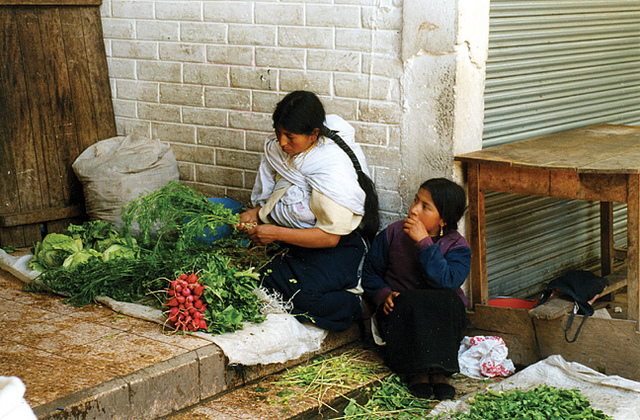The United States Agency for International Development (USAID), the International Food Policy Research Institute (IFPRI), and the Oxford Poverty and Human Development Initiative (OPHI) have come together to develop a Women’s Empowerment in Agriculture Index to measure women’s roles and engagement in the agriculture sector.
Women are a primary focus of the US Government Feed the Future (FTF) Initiative – a global hunger and food security initiative that aims to reduce poverty and undernutrition. A principal objective of FTF is to promote inclusive agricultural sector growth, a concept that is broad and multidimensional. FTF seeks both to improve women’s roles and engagement throughout the various areas of the agriculture sector, as it grows in both quantity and quality, and to operationalize that improvement by measuring change in the following domains:
- Women’s role in household decisionmaking around agricultural production
- Women’s access to productive capital
- Women’s control of income
- Women’s individual leadership and influence in the community
- Women’s time allocations.
Drawing on previous and ongoing research on gender and household decision-making in developing countries (see http://www.ifpri.org/ourwork/researcharea/gender and http://www.ophi.org.uk/research/missing-dimensions/empowerment/), researchers at IFPRI and OPHI have piloted surveys in Guatemala, Bangladesh, and Uganda to identify the precise variables that measure aspects of each of the five domains outlined above that will be used in the Index. These three countries were chosen because they have substantial variation in gender norms and socioeconomic conditions. The methodology that will be used to construct the Index will be based on OPHI’s Alkire-Foster method for measuring multidimensional concepts (such as poverty and wellbeing). (For more information on the method, see http://www.ophi.org.uk/research/multidimensional-poverty/alkire-foster-m…). All partners will participate in finalizing the indicators, weights and cutoffs that will be used to construct the final Index.
The public version is expected to be available in March 2012. The Index will be used by USAID Washington and Missions for both performance monitoring and impact evaluation purposes. Missions can use the Index for impact evaluations when they feel it is appropriate and useful. For performance monitoring, data for the Index should be collected on a biennial basis, with a representative sample in the mission’s zone of influence.
About the Index partners:
USAID is an independent federal government agency that receives overall foreign policy guidance from the Secretary of State. Its work supports long-term and equitable economic growth and advances U.S. foreign policy objectives by supporting:
- economic growth, agriculture and trade;
- global health; and,
- democracy, conflict prevention and humanitarian assistance.
Feed the Future
http://www.feedthefuture.gov/
Feed the Future is the United States Government’s global hunger and food security initiative. It supports country-driven approaches to address the root causes of hunger and poverty and forge long-term solutions to chronic food insecurity and undernutrition. Drawing upon resources and expertise of agencies across the U.S. Government, this Presidential Initiative is helping countries transform their own agricultural sectors to grow enough food sustainably to feed their people.
Feed the Future is the United States’ contribution to a collaborative global effort that supports country-owned processes and plans for improving food security and promoting transparency. Through Feed the Future, the U.S. Government is renewing its commitment to agriculture and economic growth and focusing on harnessing the power of the private sector and research to transform agricultural development.
Feed the Future represents a $3.5 billion pledge to work with partner countries, development partners, and other stakeholders to tackle global food security challenges. Our collective efforts advance global stability and prosperity by improving the most basic of human conditions: the need that families and individuals have for a reliable source of quality food and sufficient resources to purchase it.
The International Food Policy Research Institute (IFPRI) seeks sustainable solutions for reducing poverty and ending hunger and malnutrition. IFPRI’s mission is to provide policy solutions that ensure that all people in developing countries, particularly the poorest and other marginalized groups, have access to safe, sufficient, and nutritious food at all times.
IFPRI is a leader in research on gender and household decisionmaking in developing countries. Its gender and intrahousehold research program (1994-2001) provided rigorous empirical evidence that the bargaining power of men and women within households affects the allocation of household resources, and that increasing resources controlled by women improves agricultural productivity, household food security, and investments in the next generation. The Gender and Assets research program (2009-present) is examining ways by which agricultural development programming can reduce the gap in assets controlled by men and women and thereby more effectively achieve development outcomes. (Read more about the Gender and Assets research program at http://www.ifpri.org/ourwork/program/gender-and-assets).
IFPRI is one of 15 centers supported by the Consultative Group on International Agricultural Research (CGIAR), an alliance of 64 governments, private foundations, and international and regional organizations.
The Oxford Poverty and Human Development Initiative (OPHI) is an economic research centre within the Oxford Department of International Development at the University of Oxford. OPHI aims to build a more systematic framework for reducing multidimensional poverty, grounded in people’s experiences and values. Creating real tools that inform policies to reduce poverty, OPHI has two main research themes: multidimensional poverty measurement and missing dimensions of poverty data (improving data on topics like violence and empowerment).
The Alkire Foster method for multidimensional measurement, which underpins the Women’s Empowerment in Agriculture Index and was developed by OPHI, is being implemented at both the national and international level around the world. Those using and adapting the method include: the United Nations Development Programme’s Human Development Report Office (with the Multidimensional Poverty Index (MPI) in their flagship Human Development Report), and the Governments of Mexico, Colombia and Bhutan.







